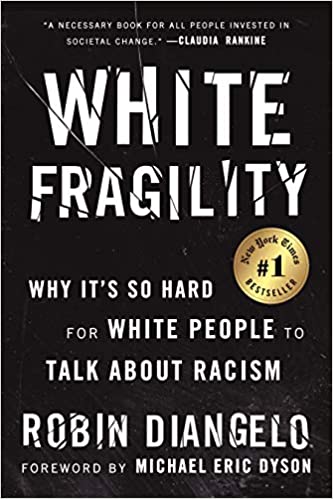Your donation will support the student journalists of Northeastern Illinois University's The Independent, either in writers' payment, additional supplies and other items of note. Your contribution will allow us to purchase additional equipment for writers/photographers/illustrators and cover our annual website hosting costs.
Book Review of White Fragility: Why It’s So Hard For White People To Talk About Racism By Robin DiAngelo
July 7, 2021

Book Cover
You are racist, but do not get upset. I am racist too. According to Robin DiAngelo’s book, “White Fragility: Why It’s So Hard For White People To Talk About Racism,” we are all a bit racist. These comments are so challenging to talk about or hear. A sense of outrage boils inside us when accused of such a thing. Many people hate to think of themselves as racist. We say to anyone who will listen that we have black, brown, indigenous, women, and LGBTQ+ friends, so we can not be racist. Yet, here we are, and according to DiAngelo, we are racists at our cores. This is a bitter pill to swallow that forces people to take stock of just who they are, for real, and what standard we have for ourselves and others.
In “White Fragility,” DiAngelo asks the reader to sit with the discomfort of being called a racist and allow it to be explained. We are invited to take a look at ourselves and understand that no matter how progressive you identify yourself, there is no way to avoid racism or racist tendencies. DiAngelo holds up a “white flag,” no pun intended, and asks us to examine our lives as she has done in hers. Admitting that she holds racist thoughts, claims that we all do and that when push comes to shove, we realize we are racists to some degree no matter how worldly we think we are.
From the very start of her book, DiAngelo’s goal is not to shock the reader but to ask them to move forward with an open mind. Many people cannot acknowledge their shortcomings, racist tendencies, believe they or their friends/family are racists. This is what DiAngelo means by white privilege, white sensitivity, and white supremacy. They are phrases used to describe caucasian people who are oversensitive or afforded privileges not afforded to people of color. White fragility is seen by many as not real. How could they be racist? DiAngelo says we all are faced with racism in some way or another every day and how we deal or don’t deal with it exposes our racist tendencies and who we are.
DiAngelo’s strong-worded book is a call to action. Her words are a figurative cold glass of water in our face, a wake-up call to action if we see that our friends, loved ones, or even strangers of a different color or race are dealing with racism. As a society, we need to help; we have to stand up and not allow such things to occur. DiAngelo asks us to say something to anyone choosing to discriminate. We are asked questions that will forever alter our way of thinking about white fragility; these questions ask us to look deep inside ourselves and see our actions for what they are; shortcomings, lackluster attempts at being on the right side. It is not the other person’s problem. We all have to be accountable for what is happening or not happening.
This book will leave you questioning what kind of character you have. The words on the pages will become a new mantra-like call to action for many, while others will learn that they’re complacent when they see injustice happening and do nothing about it. The understanding will come into focus, and they will see themselves for who they could be, allies to those dealing with racists. The question that DiAngelo leaves us all with is, “Are we ready to become anti-racist?”